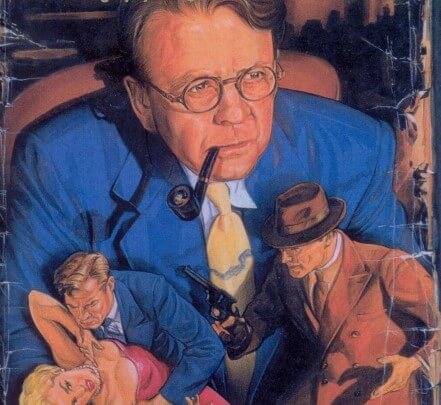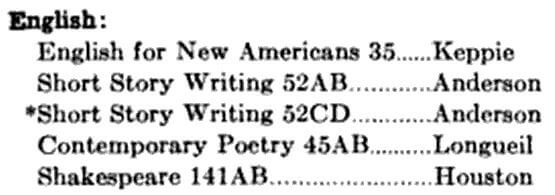He was old, his wife sick, he had lost his job, and he was drinking too much. It didn’t help that the country had hit rock-bottom in the worst financial depression of its history.
Still, the human spirit persists. In 1932, jobless and dejected Raymond Chandler (1888-1959) persisted in a very small way by signing up for a University of California Extension course called Short Story Writing 52AB.
True to the period and following all conventions, Chandler turned out a pulp story about pirates. The main character, One-eyed Mellow
glanced at the braid, once no doubt gold, that adorned the outer edges of his sleeves. He smiled insidiously, and his hand, with a movement very familiar to his men, began to wander towards the pistol stuck in his sash. As he freed it, coolly and without haste, from the broad band of dirty silk, the little dark sailor made an abrupt but very graceful movement One-eyed Mellow’s glance turned rapidly to the wall at his elbow, and he perceived his pistol hanging by the trigger-guard on the blade of a slim dagger.
“Very pretty,” he drawled at length, when the silence threatened to become unbearable.
Chandler received an “A” for his pirate short story. The only problem was that he was not meant to tell this story.
Fired and Frustrated
There is a good chance that this legendary writer of detective fiction who also helped spawn iconic noir films may have gone on, like the rest of us, to finish off his days in quiet desperation.
Tom Hiney, in Raymond Chandler: A Biography reports that 1932 was an absolute bottom year for Chandler. For one thing, Chandler was old. At 42 years old at that time, Chandler could expect to die within the next couple of decades. According to Social Security statistics, he had roughly a 50/50 chance of living to be 65 years old. If Chandler did reach 65 years old, on average he could expect to live another 13 years.
In short, 42 years old at that time was old.
On top of it, Chandler had worked as an oil company executive for the Dabney Syndicate for 13 years and had just lost his job. Drinking too much and with a sick wife, he went up to Seattle to live with some friends and dry out. Driving along the Pacific Coast, he began to pick up cheap detective pulp magazines because they were expendable: read ’em, throw ’em away. Back in Los Angeles, with nothing to back this assertion, he asserted that he was now a writer by listing himself as such in the Santa Monica telephone book. That is the time that he took the short story writing course.
Chandler’s life events came together painfully to force him toward fiction writing. Today as well as back then, we all know that type of story: unceremoniously booted from your job, you take stock of your life and start that brew pub you’ve always dreamed of. But that’s only half of it. Life events can come together to force you toward the dream, and you still end up nowhere. This isn’t about harnessing life events; it’s about telling the tale that you are uniquely positioned to tell.
Chandler’s Unique Tale
Everyone has a certain story that they are uniquely positioned to tell. The story you need to tell–zeitgeist, sweet spot, groove, perfect storm, whatever you call it–is composed of several elements that must come together.
In the 1920s, the period preceding Chandler’s first story, Los Angeles was still a sultry backwater. Yet in the 1920s and 1930s, it was growing and re-shaping seemingly by the minute. From 1920 to 1930, the population of Los Angeles more than doubled from 577,000 to 1,238,000. That was the last ten-year period when the population boomed as much.
Having spent 13 years in the oil racket, Chandler was in a unique position to tell a certain kind of story. Not a story of 17th century pirates and brigands but of the people he encountered, the low-lifes and dregs of society, as well as the idle wealthy and businessmen who formed the underpinnings of Los Angeles society.
Consciously or not, Chandler pieced together several strands, place, time, and former experience, to form the unique tale. Chandler’s sweet spot was to tell the tale of this city struggling to rise from its dusty origins of orange groves and Spanish land grants.

